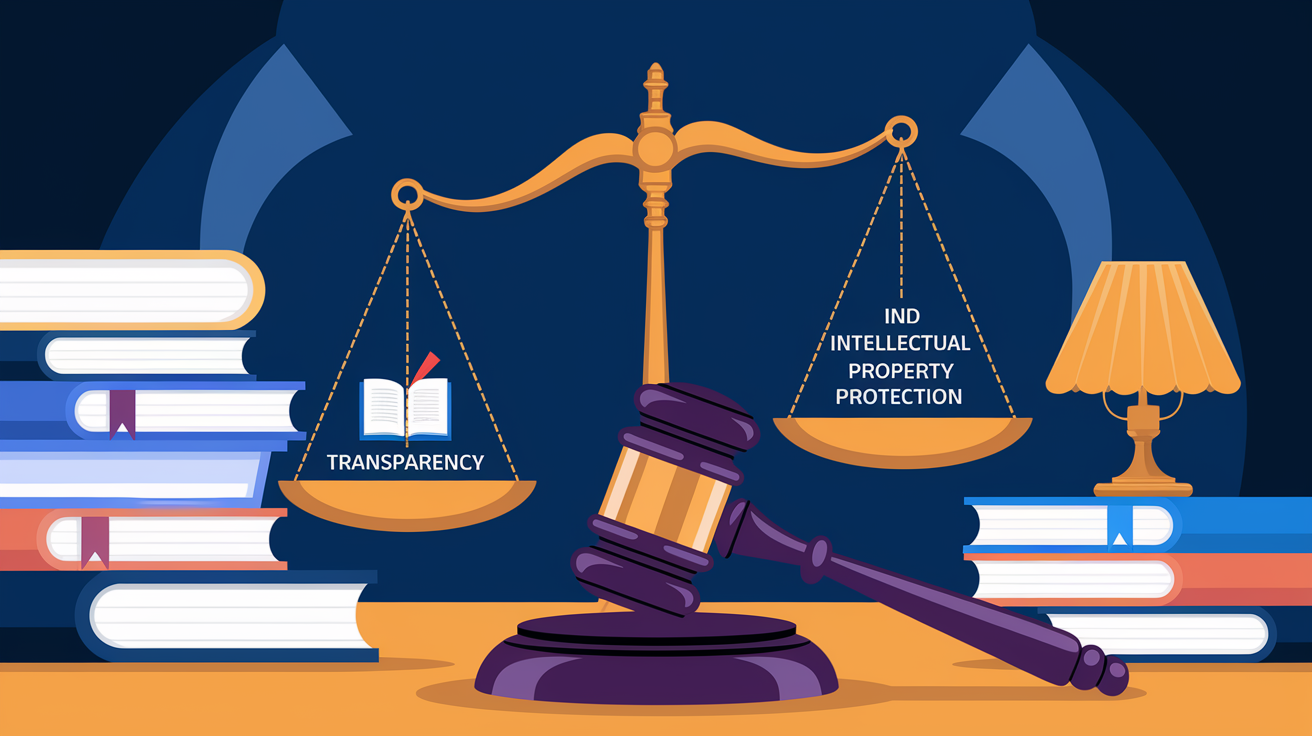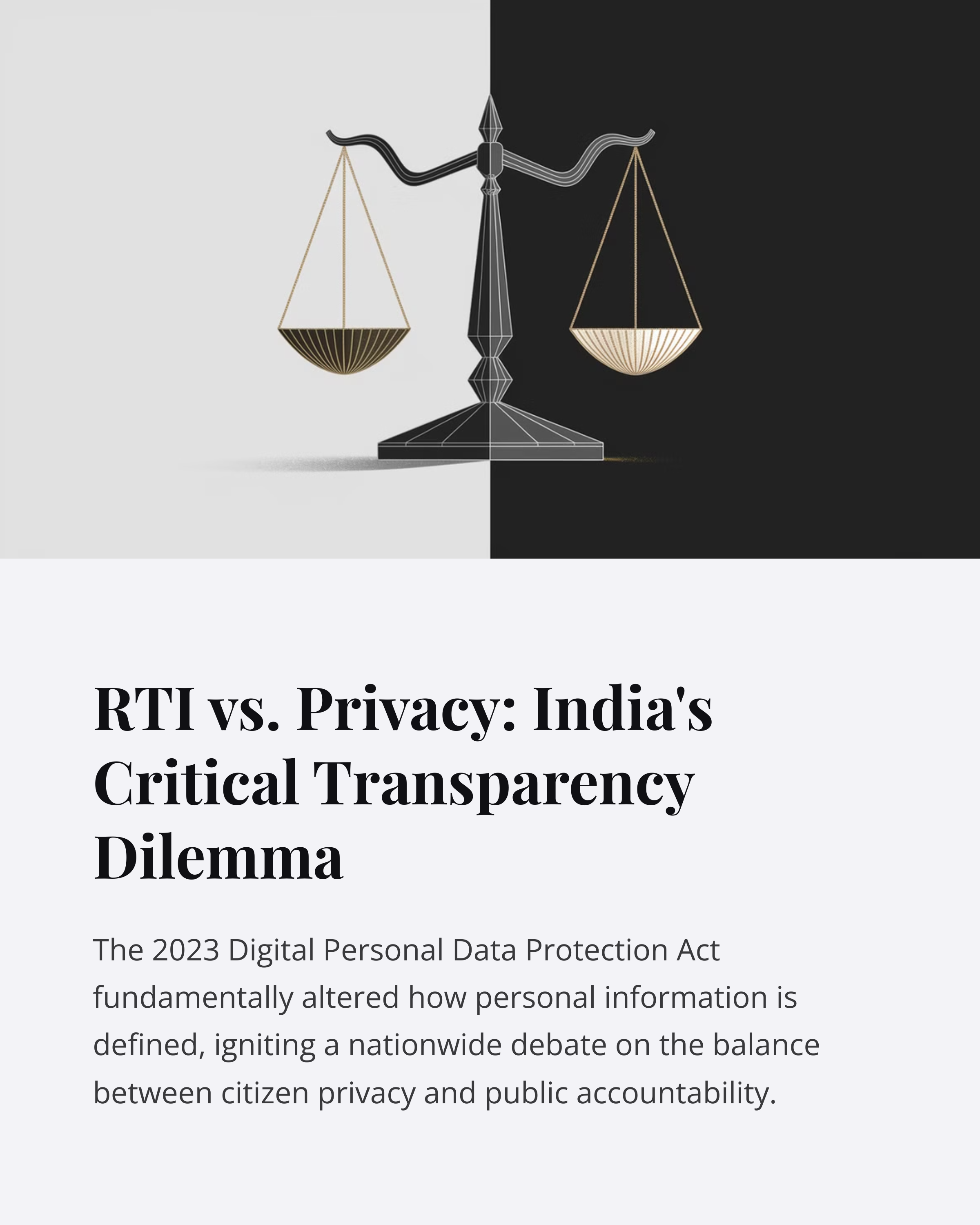Right to Information Wiki Blog

The Impact of Delhi High Court's Ruling on PhD Theses Under RTI Act: Balancing Academic Freedom and Research Transparency in India
delhi-hc-ruling-phd-theses-and-rti_1_.pdf
The Delhi High Court's landmark ruling in December 2024 regarding the disclosure of PhD theses under India's Right to Information (RTI) Act has sent ripples through the academic landscape, establishing a critical precedent that redefines the balance between intellectual property protection and public access to academic research. This judgment not only clarifies the legal framework governing research dissemination but also fundamentally influences academic freedom, research practices, and institutional policies across Indian universities. The court's nuanced approach acknowledges the complexities of modern research environments while reinforcing the principle that scholarly work, particularly that conducted at public institutions, must ultimately serve the broader academic community and public interest.
The Current State of Right to Information in India: Challenges, Judicial Interpretations, and Future Direction

Download our analysis and article
In the nearly two decades since its enactment, India's Right to Information (RTI) Act of 2005 has transformed from a revolutionary transparency tool to what some critics now call the “Right to Deny Information.” As of March 2025, the RTI landscape in India is characterized by significant judicial interventions, implementation challenges, and legislative amendments that have collectively reshaped its effectiveness. This report examines the current buzz surrounding RTI in India, analyzing recent court rulings, structural challenges, and ongoing efforts to either strengthen or dilute this crucial democratic pillar.
The Judicial Interpretation Landscape The last year has witnessed numerous significant court rulings that have refined the scope and application of the RTI Act across India. These judgments have created precedents that define what constitutes “information,” the balance between transparency and privacy, and the obligations of various public authorities under the law.
Bombay High Court: Refining RTI Boundaries The Bombay High Court has issued several landmark rulings in 2024 that significantly impact RTI implementation. In one notable case, the court clarified that “reasons for delay in deciding a case” cannot qualify as “information” under the RTI Act, essentially limiting the scope of what citizens can demand from public authorities1. This ruling came in response to the Central Information Commission imposing costs on the Secretary of the Bar Council of Maharashtra and Goa for failing to provide reasons for a delayed decision in a complaint against an advocate.
In contrast, the same court took a more expansive approach regarding transparency in public recruitment processes. It held that disclosing marks obtained by candidates in public recruitment does not constitute an invasion of privacy, effectively prioritizing public interest in fair selection processes over individual privacy concerns1. This judgment quashed orders by various authorities that had denied such information, establishing that transparency in public appointments outweighs privacy considerations in certain contexts.
Delhi High Court: Balancing Security and Transparency The Delhi High Court has been particularly active in shaping RTI jurisprudence, with Justice Sanjeev Narula delivering several consequential rulings. The court ruled that while the Central Bureau of Investigation (CBI) is not entirely exempted from the RTI Act, it may withhold information related to “sensitive investigations,” though it must provide information related to corruption and human rights violations1. This balanced approach attempts to reconcile national security concerns with the public's right to know.
In another significant decision, the court determined that PhD theses not containing commercially sensitive or proprietary information are not exempt from disclosure under Section 8(1)(d) of the RTI Act1. This ruling reinforces academic transparency while still protecting genuine intellectual property interests.
The Delhi High Court also established boundaries between regulatory functions and RTI obligations when it ruled that the Telecom Regulatory Authority of India's (TRAI) duties do not extend to seeking information about individual complaints from telecom service providers solely for RTI purposes14. This clarifies the extent to which regulatory bodies must go to satisfy RTI requests that fall outside their primary functions.
Madras High Court: Public Servants' Accountability In a ruling with significant implications for government transparency, the Madras High Court held that assets and liabilities of public servants cannot be completely exempted from public scrutiny under Section 8 of the RTI Act1. Justice CV Karthikeyan specifically observed that service registers containing details of assets and liabilities of public servants are not private information and cannot be shielded from public view, though reasonable restrictions may apply to protect legitimate privacy interests1. This judgment reinforces the principle that those in public service must maintain a higher standard of transparency regarding their financial affairs.
Structural Challenges to RTI Implementation Despite its transformative potential, the RTI Act faces severe implementation challenges that threaten to undermine its effectiveness. The machinery established to enforce the law is struggling under the weight of systemic issues, bureaucratic resistance, and resource constraints.
The Crisis of Pendency and Vacant Positions The RTI ecosystem in India is currently grappling with an unprecedented backlog of cases. As of February 2025, an astounding 4.2 crore RTI applications and 26 lakh second appeals remain pending across the country, with applicants facing an average wait time of two years for resolution11. This massive pendency effectively denies timely access to information, defeating the very purpose of the Act which mandates responses within 30 days.
The situation is particularly dire at the Central Information Commission (CIC), which is operating with just three commissioners out of the sanctioned strength of eleven, resulting in over 23,000 pending appeals as of January 202511. This severe understaffing has prompted the Supreme Court to express its concerns in January 2025 over the “absolutely inadequate” functioning of the RTI machinery and the delays in appointing Information Commissioners3.
The state-level picture is equally concerning, with Tamil Nadu reporting that 45-47% of appeals face delays of 2-3 years, and only 10% are resolved within a year11. These delays transform the RTI from a tool for timely accountability into a frustrating bureaucratic exercise for citizens seeking information.
Non-Compliance Culture and Strategic Denials Beyond institutional bottlenecks, there exists a pervasive culture of non-compliance with the RTI Act. Despite provisions for penalties against officials who unreasonably withhold information, only 4% of cases saw penalties imposed on Public Information Officers between 2015 and 202311. In Tamil Nadu, for instance, the State Information Commission penalized officials in just 21 out of 13,966 cases in 2024, reflecting a systemic failure to enforce compliance11.
Strategic denials have become increasingly common, with the Prime Minister's Office and key ministries reportedly rejecting 30% of RTI queries under various exemptions in Section 8 of the Act11. These rejections often involve matters of significant public interest, such as details on electoral bonds and defense deals, raising questions about whether exemptions are being used to shield authorities from legitimate scrutiny rather than protect genuinely sensitive information.
The Human Cost: Attacks on RTI Activists Perhaps the most disturbing trend in the RTI landscape is the violence directed at information seekers. Over 100 RTI users have been attacked or killed since 2005, including high-profile cases like Maharashtra's Satish Shetty in 2010 and Bihar's Bhola Yadav in 202211. These attacks create a chilling effect on citizens' willingness to use the RTI mechanism, particularly for exposing corruption or powerful interests. The failure to protect information seekers threatens to undermine the democratic foundations of the RTI Act by making transparency a potentially life-threatening pursuit.
Legislative Challenges and Amendments The original vision of the RTI Act has faced significant legislative challenges in recent years, with amendments and new laws that critics argue have diluted its effectiveness and scope.
The Digital Personal Data Protection Act's Impact The Digital Personal Data Protection Act (DPDP) of 2023 has emerged as a significant challenge to RTI efficacy. The Act modified Section 8(1)(j) of the RTI Act, replacing it with a blanket exemption for “information relating to personal data” without the previous public interest override provisions11. This change has had immediate impacts, with reports indicating a 48% surge in RTI rejections linked to personal data in 202411.
Before its passage, NITI Aayog, the government's own think tank, had formally urged the Ministry of Electronics and Information Technology to reconsider the DPDP Bill, citing its potential negative repercussions on the RTI Act3. Despite these concerns, the legislation was passed, expanding the definition of “person” to include corporations, Hindu Undivided Families (HUFs), and the State itself, thereby broadening the scope of information that can be denied11.
The consequences of these changes are already visible. In Tamil Nadu, authorities have denied access to MLA fund utilization records by classifying such information as “personal data”11. This expansive interpretation of personal data threatens to shield significant public interest information from scrutiny, undermining the fundamental purpose of the RTI Act.
The 2019 RTI Amendment Bill The 2019 RTI Amendment Bill introduced changes to the terms and conditions of appointment for the Chief Information Commissioner and Information Commissioners at both central and state levels8. Critics, including opposition members and activists, argued that these changes undermined the autonomy and independence of Information Commissions by giving the central government greater control over these positions8. By altering the fixed tenure and salary provisions that were initially designed to insulate these positions from government influence, the amendments potentially compromised the impartiality of information commissioners in cases involving sensitive government information.
Current Initiatives and Future Directions Despite the challenges, there are ongoing efforts to revitalize and expand the reach of the RTI Act across India. These initiatives represent potential pathways for strengthening the transparency framework in the country.
RTI Awareness at Maha Kumbh 2025 A notable current initiative is the Uttar Pradesh government's campaign to create RTI awareness during the Maha Kumbh 2025 religious gathering4. This massive event, which attracts millions of devotees, is being leveraged as an opportunity to educate citizens about their right to information. Information Commissioners from the state will be present at the mela campus to inform visitors about various aspects of the RTI Act4.
The initiative also embraces digital methods, with plans to introduce devotees to accessing information through platforms such as Google, Facebook, X (formerly Twitter), Instagram, and WhatsApp4. This digital focus aligns with Prime Minister Modi's and Chief Minister Yogi Adityanath's call for digitizing the Maha Kumbh and potentially expands RTI access to previously unreached populations.
Proposals for Strengthening Information Commissions To address the crisis of pendency and vacancies, experts have proposed several institutional reforms for Information Commissions. These include mandating diversity in appointments by requiring 50% of commissioners to come from non-bureaucratic backgrounds, imposing strict time limits for appeal disposal, and linking funding to performance metrics11. Implementing AI-driven dashboards for real-time monitoring of appeals, similar to Telangana's portal which has reportedly achieved 30% faster processing, has also been suggested as a technological solution to enhance efficiency11.
Legislative Reform Proposals To counter the dilution of the RTI Act through the DPDP Act, there are calls for a new RTI Amendment Bill that would insert provisions to override DPDP exemptions when public interest outweighs privacy concerns11. Proponents of this approach cite judicial precedents affirming that in a democracy, accountability must sometimes take precedence over secrecy. There are also suggestions to create synergy between the RTI Act and the Lokpal Act (2013) to enhance transparency in asset disclosures of public officials11.
Conclusion The Right to Information Act in India stands at a critical juncture in early 2025. While it remains a powerful tool for transparency and accountability, its effectiveness is being challenged by significant structural problems, legislative amendments, and a culture of resistance within the bureaucracy. The massive pendency of applications, vacancies in Information Commissions, strategic denials of information, and concerning amendments have collectively earned it the unflattering nickname “Right to Deny Information” among activists11.
Yet, there are glimmers of hope in ongoing awareness initiatives, judicial affirmations of transparency principles, and proposals for institutional reforms. The future of RTI in India will likely depend on addressing the pendency crisis, filling vacancies in Information Commissions, protecting RTI activists from violence, and restoring provisions that prioritize public interest over blanket exemptions.
As the RTI Act approaches its 20th anniversary, the challenge for India remains to reclaim its original promise as a “master key to democracy” and transform it from what critics now call the “Right to Deny Information” back to a robust Right to Information that empowers citizens in their engagement with governance. The resolution of this tension between transparency and opacity will significantly influence the quality and depth of Indian democracy in the years to come.
~~AUTHORS:off~~







